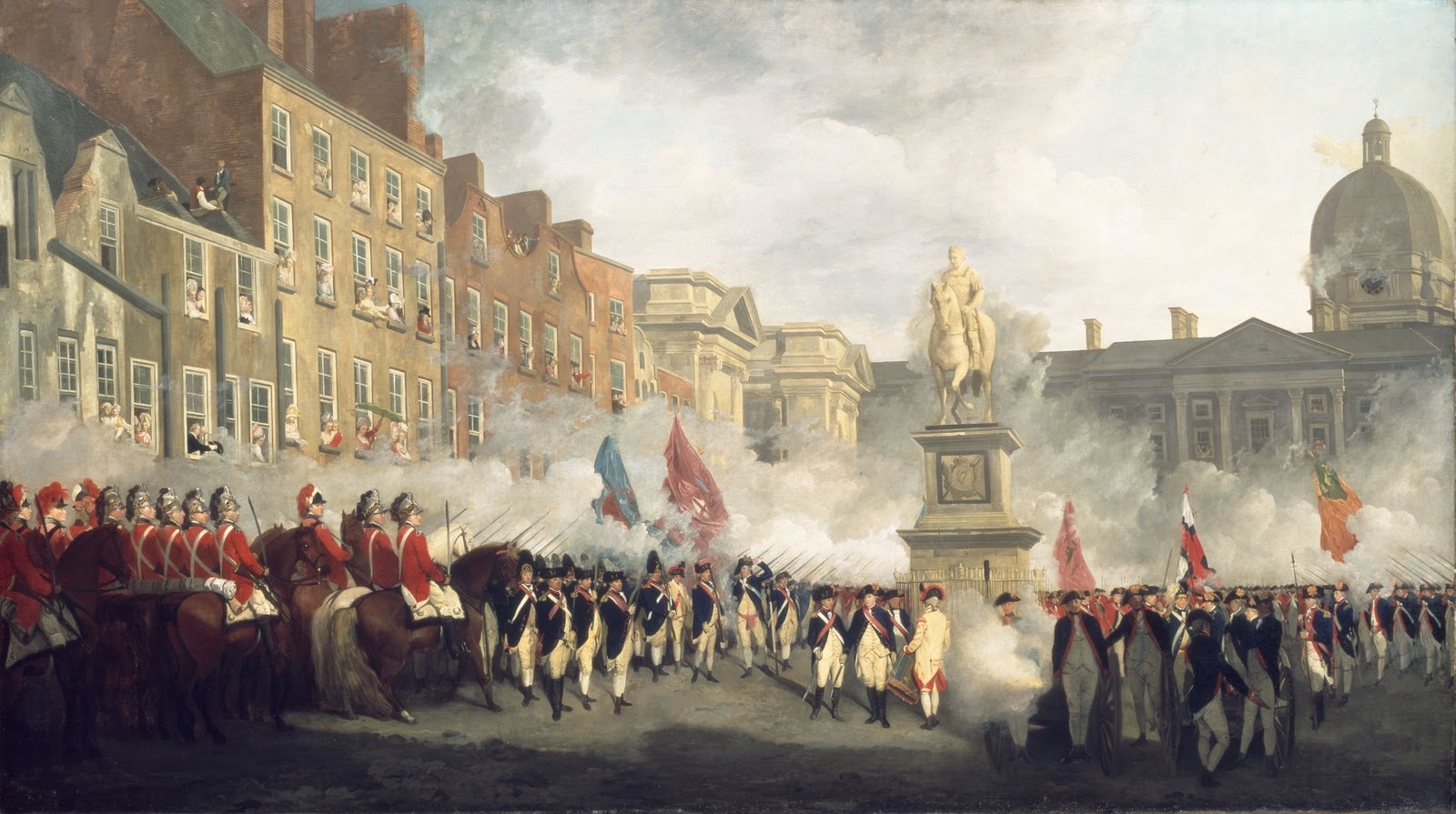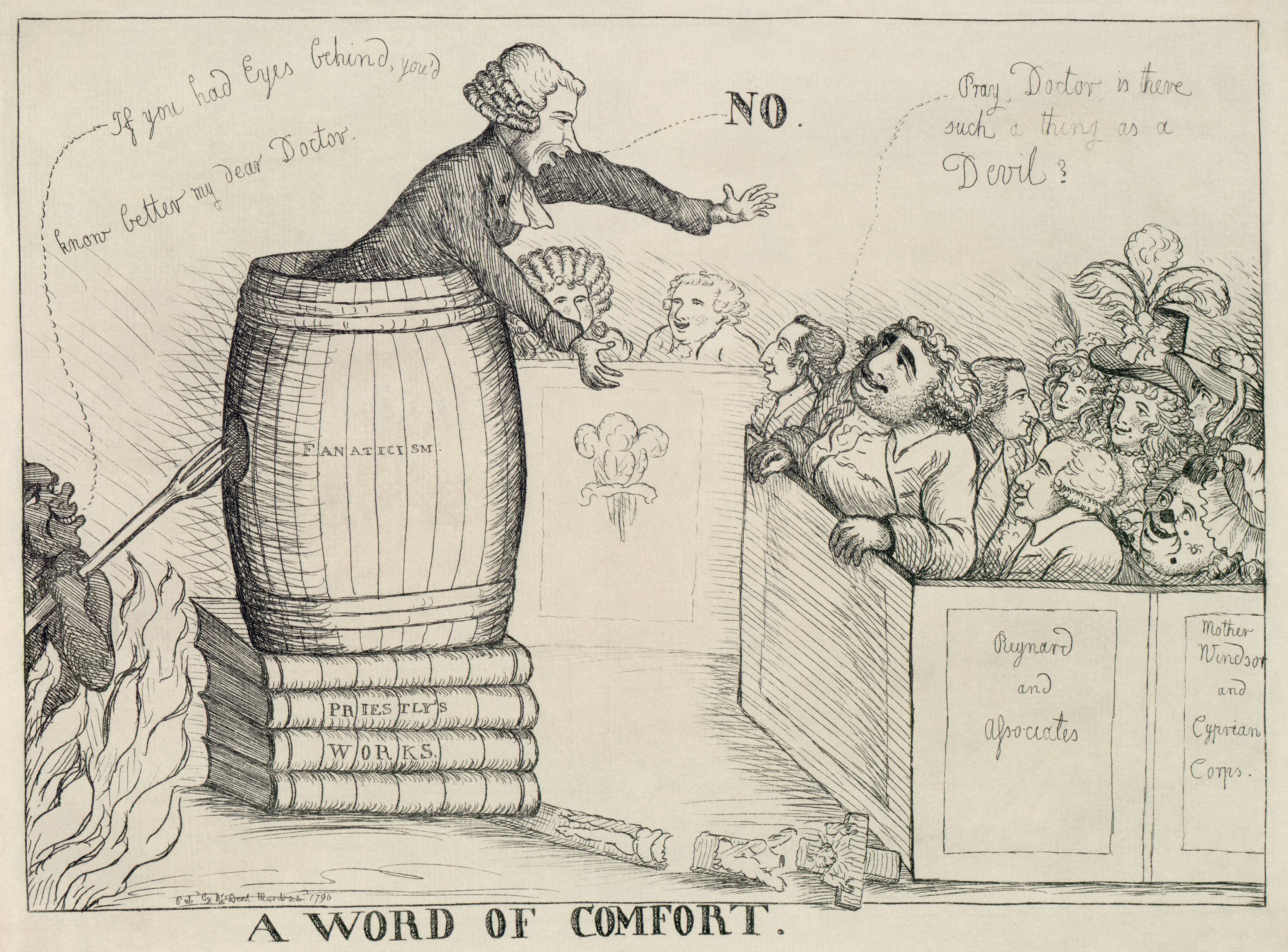|
London Corresponding Society
The London Corresponding Society (LCS) was a federation of local reading and debating clubs that in the decade following the French Revolution agitated for the democratic reform of the British Parliament. In contrast to other reform associations of the period, it drew largely upon working men (artisans, tradesmen, and shopkeepers) and was itself organised on a formal democratic basis. Characterising it as an instrument of French revolutionary subversion, and citing links to the insurrectionist United Irishmen, the government of William Pitt the Younger sought to break the Society, twice charging leading members with complicity in plots to assassinate the King. Measures against the society intensified in the wake of the naval mutinies of 1797, the 1798 Irish Rebellion and growing protest against the continuation of the war with France. In 1799, new legislation suppressed the Society by name, along with the remnants of the United Irishmen and their franchise organisations, Un ... [...More Info...] [...Related Items...] OR: [Wikipedia] [Google] [Baidu] |
Radicalism (historical)
Radicalism (from French ) was a political movement representing the leftward flank of liberalism between the late 18th and early 20th century. Certain aspects of the movement were precursors to a wide variety of modern-day movements, ranging from '' laissez-faire'' to social liberalism, social democracy, civil libertarianism, and modern progressivism. This ideology is commonly referred to as "radicalism" but is sometimes referred to as radical liberalism, or classical radicalism, to distinguish it from radical politics. Its earliest beginnings are to be found during the English Civil War with the Levellers and later the Radical Whigs. During the 19th century in the United Kingdom, continental Europe and Latin America, the term ''radical'' came to denote a progressive liberal ideology inspired by the French Revolution. Radicalism grew prominent during the 1830s in the United Kingdom with the Chartists and in Belgium with the Revolution of 1830, then across Europe in the 1 ... [...More Info...] [...Related Items...] OR: [Wikipedia] [Google] [Baidu] |
Society For Constitutional Information
The Society for Constitutional Information was a British activist group founded in 1780 by Major John Cartwright, to promote parliamentary reform and knowledge of the English constitution. It was an organisation of social reformers, many of whom were drawn from the rational dissenting community, dedicated to publishing political tracts aimed at educating fellow citizens on their lost ancient liberties. It promoted the work of Thomas Paine and other campaigners for parliamentary reform. Most members of the Society for Constitutional Information were also opposed to the slave trade.Simkin, John.Society for Constitutional Information" ''Spartacus Educational'', Spartacus Educational, Sept. 1997, spartacus-educational.com/PRsocietyC.htm. It was particularly strong in Sheffield. The Society flourished until 1783, but thereafter made little headway. The organisation promoted Thomas Paine's '' Rights of Man'' and other radical publications, and under the leadership of John Horne Took ... [...More Info...] [...Related Items...] OR: [Wikipedia] [Google] [Baidu] |
Thomas Paine
Thomas Paine (born Thomas Pain; – In the contemporary record as noted by Conway, Paine's birth date is given as January 29, 1736–37. Common practice was to use a dash or a slash to separate the old-style year from the new-style year. In the old calendar, the new year began on March 25, not January 1. Paine's birth date, therefore, would have been before New Year, 1737. In the new style, his birth date advances by eleven days and his year increases by one to February 9, 1737. The Old Style and New Style dates, O.S. link gives more detail if needed. – June 8, 1809) was an English-born American Founding Fathers of the United States, Founding Father, French Revolutionary, inventor, and political philosophy, political philosopher. He authored ''Common Sense'' (1776) and ''The American Crisis'' (1776–1783), two of the most influential pamphlets at the start of the American Revolution, and he helped to inspire the Colonial history of the United States, colonial era Patriot ... [...More Info...] [...Related Items...] OR: [Wikipedia] [Google] [Baidu] |
Portland State University
Portland State University (PSU) is a public research university in Portland, Oregon, United States. It was founded in 1946 as a post-secondary educational institution for World War II veterans. It evolved into a four-year college over the next 20 years and was granted university status in 1969. It is one of two public universities in Oregon that are in a large city. It is governed by a board of trustees. PSU is classified among "R2: Doctoral Universities – High research activity". Portland State comprises seven constituent colleges, offering undergraduate degrees in 123 fields and postgraduate degrees in 117 fields. As of 2023, the university had a total enrollment of approximately 21,000 students. Its athletic teams are known as the Portland State Vikings, with school colors of green and white. They compete at the NCAA Division I level, primarily in the Big Sky Conference. History 1946–1964: Establishment Portland State University was established as the Vanport Exte ... [...More Info...] [...Related Items...] OR: [Wikipedia] [Google] [Baidu] |
Irish Volunteers (18th Century)
The Volunteers (also known as the Irish Volunteers) were militia units raised by local initiative in Kingdom of Ireland, Ireland in 1778. Their original purpose was to guard against invasion and to preserve law and order after much of the Irish Army (1661–1801), Irish Army was sent to fight abroad as part of the American Revolutionary War, American War of Independence and the Dublin Castle administration failed to expand the militia. Taking advantage of the Parliament of Great Britain's preoccupation with the American War of Independence, the Volunteers were able to pressure them into conceding legislative independence to the Parliament of Ireland. Members of the Belfast Volunteers laid the foundations for the establishment of the Society of United Irishmen. The majority of the Volunteers, however, were Unionism in Ireland, unionists, and later helped to suppress the Irish Rebellion of 1798.Ulster Museum, History of Belfast exhibition According to historian Thomas Bartlett ... [...More Info...] [...Related Items...] OR: [Wikipedia] [Google] [Baidu] |
American Revolutionary War
The American Revolutionary War (April 19, 1775 – September 3, 1783), also known as the Revolutionary War or American War of Independence, was the armed conflict that comprised the final eight years of the broader American Revolution, in which American Patriot (American Revolution), Patriot forces organized as the Continental Army and commanded by George Washington defeated the British Army during the American Revolutionary War, British Army. The conflict was fought in North America, the Caribbean, and the Atlantic Ocean. The war's outcome seemed uncertain for most of the war. However, Washington and the Continental Army's decisive victory in the Siege of Yorktown in 1781 led King George III and the Kingdom of Great Britain to negotiate an end to the war in the Treaty of Paris (1783), Treaty of Paris two years later, in 1783, in which the British monarchy acknowledged the independence of the Thirteen Colonies, leading to the establishment of the United States as an independent and ... [...More Info...] [...Related Items...] OR: [Wikipedia] [Google] [Baidu] |
Test Act 1673
The Test Acts were a series of penal laws originating in Restoration England, passed by the Parliament of England, that served as a religious test for public office and imposed various civil disabilities on Catholics and nonconformist Protestants. The underlying principle was that only people taking communion in the established Church of England were eligible for public employment, and the severe penalties pronounced against recusants, whether Catholic or nonconformist, were affirmations of this principle. Although theoretically encompassing all who refuse to comply with Anglicanism in a dragnet approach, in practice the nonconformist Protestants had many defenders in Parliament and were often exempted from some of these laws through the regular passage of Acts of Indemnity: in particular, the Indemnity Act 1727 relieved Nonconformists from the requirements in the Test Act 1673 and the Corporation Act 1661 that public office holders must have taken the sacrament of ... [...More Info...] [...Related Items...] OR: [Wikipedia] [Google] [Baidu] |
Corporation Act 1661
The Corporation Act 1661 ( 13 Cha. 2 St. 2. c. 1) was an act of the Parliament of England. It belonged to the general category of test acts, designed for the express purpose of restricting public offices in England to members of the Church of England. Though commonly spoken of as one of the "Penal Laws", and enumerated by Butler in his ''Historical Account of the Laws against the Roman Catholics of England'', it was not directly aimed against them, but against the Presbyterians. It was passed in December 1661, the year after the Restoration, by Charles II. The Cavalier Parliament aimed at restoring England to its state before the time of the Commonwealth. It required all the prudence of the Earl of Clarendon, the chancellor, to restrain them. The Corporation Act represents the limit to which he was prepared to go in endeavouring to restrict the power of the Presbyterians. They were influentially represented in the government of cities and boroughs throughout the country, and ... [...More Info...] [...Related Items...] OR: [Wikipedia] [Google] [Baidu] |
Glorious Revolution
The Glorious Revolution, also known as the Revolution of 1688, was the deposition of James II and VII, James II and VII in November 1688. He was replaced by his daughter Mary II, Mary II and her Dutch husband, William III of Orange (William III and II), a nephew of James who thereby had an interest to the throne irrespective of his marriage to his cousin Mary. The two ruled as joint monarchs of Kingdom of England, England, Kingdom of Scotland, Scotland, and Kingdom of Ireland, Ireland until Mary's death in 1694, when William became ruler in his own right. Jacobitism, the political movement that aimed to restore the exiled James or his descendants of the House of Stuart to the throne, persisted into the late 18th century. William's invasion was the last successful invasion of England. Despite his own Catholicism, usually an impediment to Protestant support, James became king in February 1685 with widespread backing from the Protestant majorities in England and Scotla ... [...More Info...] [...Related Items...] OR: [Wikipedia] [Google] [Baidu] |
Centennial
A centennial, or centenary in British English, is a 100th anniversary or otherwise relates to a century. Notable events Notable centennial events at a national or world-level include: * Centennial Exhibition, 1876, Philadelphia, Pennsylvania. First official World's Fair in the United States, celebrating the 100th anniversary of the signing of the Declaration of Independence in Philadelphia. About 10 million visitors attended, equivalent to about 20% of the population of the United States at the time. The exhibition ran from May 10, 1876, to November 10, 1876. (It included a monorail.) * New Zealand Centennial Exhibition, 1939–1940, celebrated one hundred years since the signing of the Treaty of Waitangi in 1840 and the subsequent mass European settlement of New Zealand. 2,641,043 (2.6 million) visitors attended the exhibition, which ran from 8 November 1939 until 4 May 1940. * 1967 International and Universal Exposition, better known as ''Expo 67'', celebrating Canada's cen ... [...More Info...] [...Related Items...] OR: [Wikipedia] [Google] [Baidu] |
Revolution Society
The London Revolution Society was formed 1788, ostensibly to commemorate the centennial of the Glorious Revolution of 1688 and the landing of William III, and was one of several radical societies in Britain in the 1790s. Other similar Revolution Societies were formed in provincial cities such as Norwich, which rivalled Sheffield as the centre of English Jacobinism. Many of the members of the London Revolution Society were also members of the Society for Constitutional Information (CSI), 1780–1794. Along with some Anglicans a large number of English Dissenters and Unitarians were at the centre of the Society including Richard Price, Joseph Priestley, Andrew Kippis, Abraham Rees, Theophilus Lindsey, Thomas Belsham, Thomas Brand Hollis and Peter Finch Martineau. At the time of the fall of the Bastille in July 1789, the London Revolution Society was the most vocal of the radical societies. The meeting place in 1789 was the London Tavern. The group became increasingly suppor ... [...More Info...] [...Related Items...] OR: [Wikipedia] [Google] [Baidu] |







